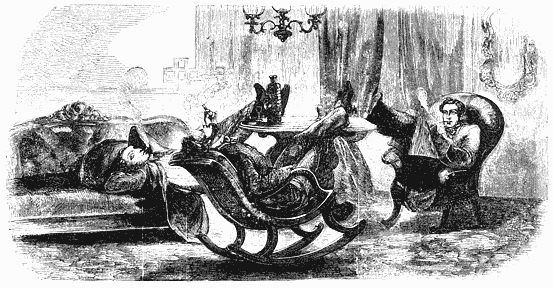Individualism versus Marriage and Child Rearing
Observers of hotel life saw resident pipe fitters, maiden aunts, and mobile professional people as abnormal for several reasons. Beginning as early as the 1840s, critics worried that hotel life delayed marriage for single residents; for married couples, hotel life also seemed to delay child bearing.[30] According to Wolfe in 1906, the distractions of living downtown rendered people selfish and self-centered and emphasized "the individual life at the expense of the family and the home." Marriage became "too great a sacrifice"; children meant "expense and trouble and constant attention and 'being tied down at home.'" The American standard of living, he continued, was becoming an individual standard rather than a family standard. Roomers learned very soon the art of
Figure 7.6
"How We Sit in Our Hotel Homes." This engraving from an 1857 Harper's Weekly story about
living in New York City hotels showed how much men needed traditional home life.
"seeking everywhere the greatest individual comfort at the least expense.[31]
Hotel living did imply childlessness. On the one hand, hotel and rooming house zones had the lowest birthrates for most cities and stood in sharp contrast to home-ownership areas with their high marriage rates and birthrates. In 1900, 95 percent of those owning houses in San Francisco were married, and 81 percent had children. Looking at these phenomena, social scientists and reformers did not assume market sorting as an explanation, that is, that unmarried childless people simply chose hotel housing. Instead, the reformers concluded that hotel housing caused the antifamily phenomena.[32] Based on the long history of problem children in hotels, housing professionals and hotel residents agreed that the environment suited children poorly.
To social arbiters, worse than delayed marriage or child bearing was never marrying at all. About one-tenth of the American population typically has never married, and as much as one-third of New York City's population lived alone in 1930. Yet, through the 1950s, Americans widely considered the condition of being unattached as either temporary or abnormal. The premier housing scholar, James Ford, wrote that having few contacts with married couples, children, and people
outside one's own age and sex group tended to make the lives of hotel people seem aberrant. Wolfe spoke of marriage "rescuing" tenants "from the rooming house world and its sophisticating, leveling, and contaminating influences." Chicago social workers visited groups of workingmen who were sharing apartments and were surprised that the men were "extremely friendly," as if hospitality and friendliness were found only in family households.[33]
The relative absence of children was responsible for much of the unnatural character of single-room districts. Zorbaugh, the Chicago sociologist, felt that children were the real neighbors; childless districts therefore lacked a key catalyst of neighborly feeling. Sociologists noted that children forced adults to plan and hope for the future and to consider other-directed action. While child-filled tenements sparked hope (or its frustrated form of outrage), hotel housing rarely evinced either.[34] In order for there to be a proper neighborhood for children, the majority of American middle and upper class families also typically demanded yards or gardens. The reliance on yards as social separation zones related to another cluster of hotel critiques.
